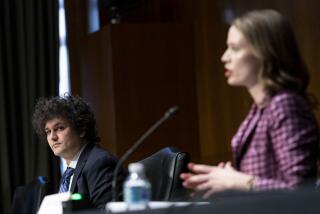Drexel Units File Under Chapter 11 : Securities: John Sorte will replace Frederick Joseph as chief of the brokerage. The parent firm also said it will stay in business.
- Share via
NEW YORK — Drexel Burnham Lambert put its main brokerage unit and 14 other subsidiaries into bankruptcy proceedings Tuesday and named John F. Sorte, 42, to succeed Frederick H. Joseph as chief executive of the brokerage.
Drexel also confirmed that the company plans to reorganize and emerge from bankruptcy proceedings as a going concern, although much smaller and with limited activities. Until recently, Drexel officials had said the entire company would be liquidated.
Joseph will keep his positions as president of the parent company, Drexel Burnham Lambert Group, and as vice chairman of the brokerage, Drexel Burnham Lambert Inc. Sources among bankruptcy lawyers in the case said removing Joseph as head of the brokerage unit may be a move to assuage creditors who blame Joseph for the firm’s slide into bankruptcy.
A Drexel spokesman said Sorte was named head of the brokerage because much of Joseph’s time has been consumed by matters related to the bankruptcy. As the company looked forward to going back into business, “it made sense to have someone get involved in day-to-day planning,” said the spokesman, Steven Anreder.
However, Joseph has been blamed publicly for some of the decisions that led to the toppling of Drexel from its position as one of the pre-eminent firms on Wall Street. Barry J. Dichter, a lawyer for Cadwalader, Wickersham & Taft, which represents a Drexel creditor, said that whether or not Joseph caused Drexel’s problems, he “is a lightning rod for criticism of the old Drexel management.”
By replacing Joseph as head of the brokerage unit, Dichter said, the company probably forestalled a move by creditors to have the bankruptcy court appoint a trustee to run the subsidiary.
Sorte had been co-head of Drexel’s corporate finance department since April, 1989. He was also named Tuesday to the positions of director and senior executive vice president of the parent firm.
The parent company filed for protection from creditors under Chap. 11 of the U.S. Bankruptcy Code on Feb. 13, after facing a cash crisis. However, most of the subsidiaries had remained out of bankruptcy as they ceased normal operations and sold off positions in securities. The 15 Drexel units that started bankruptcy proceedings Tuesday all filed under Chapter 11, which gives companies protection from creditors while allowing current management to work out a plan of reorganization.
Anreder confirmed that the decision to take the units into bankruptcy proceedings in part represents an attempt to deal with the blizzard of lawsuits faced by the units. He also said it would facilitate bringing a reorganized company out of bankruptcy.
Drexel faces perhaps hundreds of lawsuits in different jurisdictions around the country. “The prospect of litigating in courts around the country what could be hundreds of lawsuits is not an appealing prospect,” Dichter said. Tuesday’s move will consolidate nearly all of the suits under the bankruptcy court. In addition, Drexel’s reorganization plan will allow it to make provisions for the legal claims and emerge cleansed of the liabilities from the lawsuits.
A financial statement recently filed with the bankruptcy court, covering up to the end of April, shows that the parent company’s net worth has eroded considerably from a month earlier. Shareholders’ equity--assets minus liabilities, or net worth--totaled $335.9 million, down from $444 million in the report filed for March. Anreder said March figures were “soft figures” because of the difficulty that accountants and bankruptcy lawyers had in assigning values to Drexel’s assets. He said a big part of the decrease was related to writing down the value of certain Drexel leases.
Most of Drexel’s shareholders are former or current employees, and they stand to get nothing for their stock unless other creditors are paid off first. The company said in court papers that Tuesday’s Chapter 11 filing will help the units “utilize and realize the full value of their respective assets.”
The parent company at the end of April had total assets of $3.1 billion and liabilities of $2.8 billion. The firm has about 500 employees, down from about 5,300 just before the bankruptcy filing in February.
Anreder declined to discuss plans for the reorganized company. However, it is expected that it will concentrate on managing the firm’s remaining portfolio of securities, and it may offer limited investment banking services to corporate clients. The firm isn’t expected to re-emerge as a securities broker-dealer.
Anreder said about half a dozen Drexel units remain out of bankruptcy proceedings, including the firm’s government securities unit, which has liquidated all or nearly all of its holdings.
More to Read
Inside the business of entertainment
The Wide Shot brings you news, analysis and insights on everything from streaming wars to production — and what it all means for the future.
You may occasionally receive promotional content from the Los Angeles Times.










